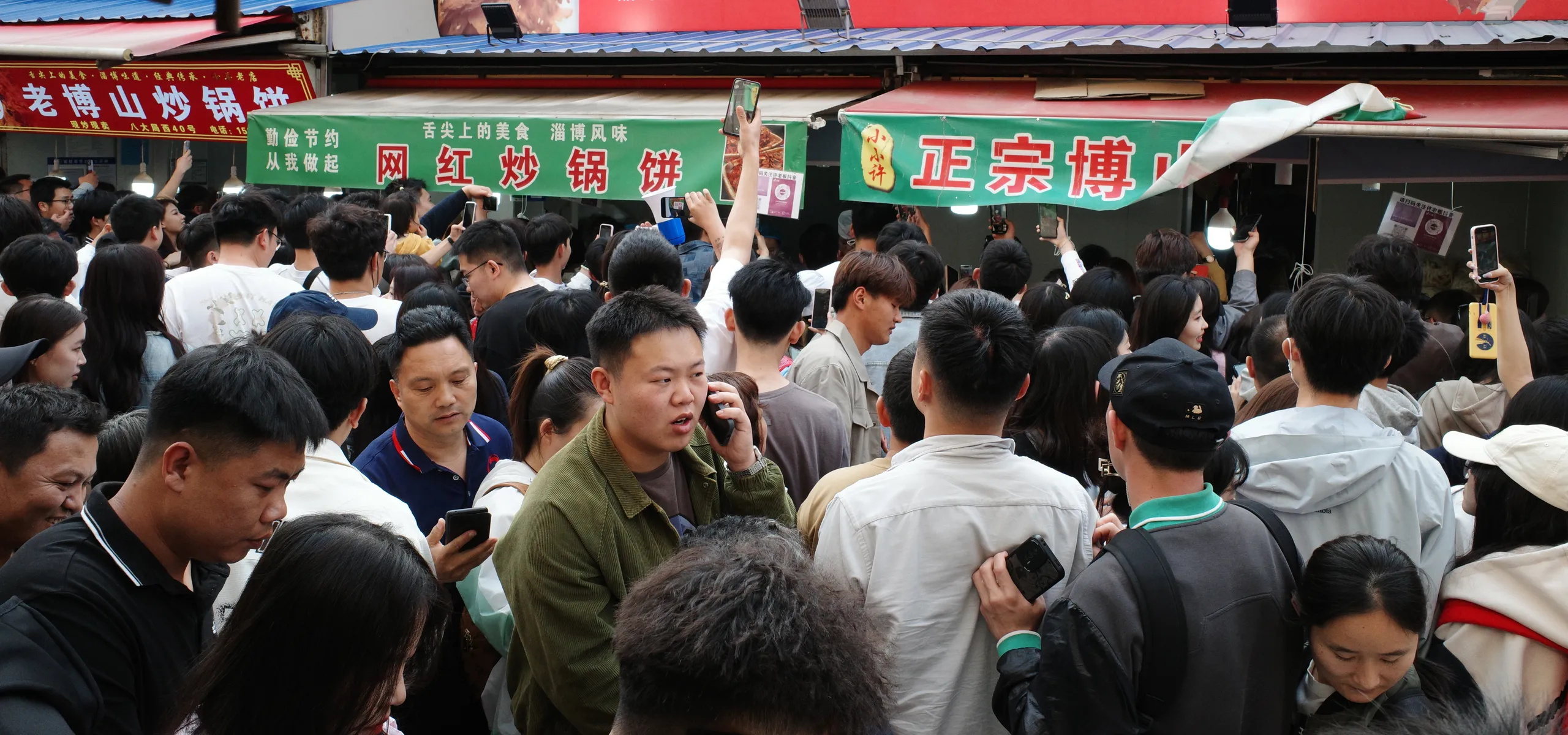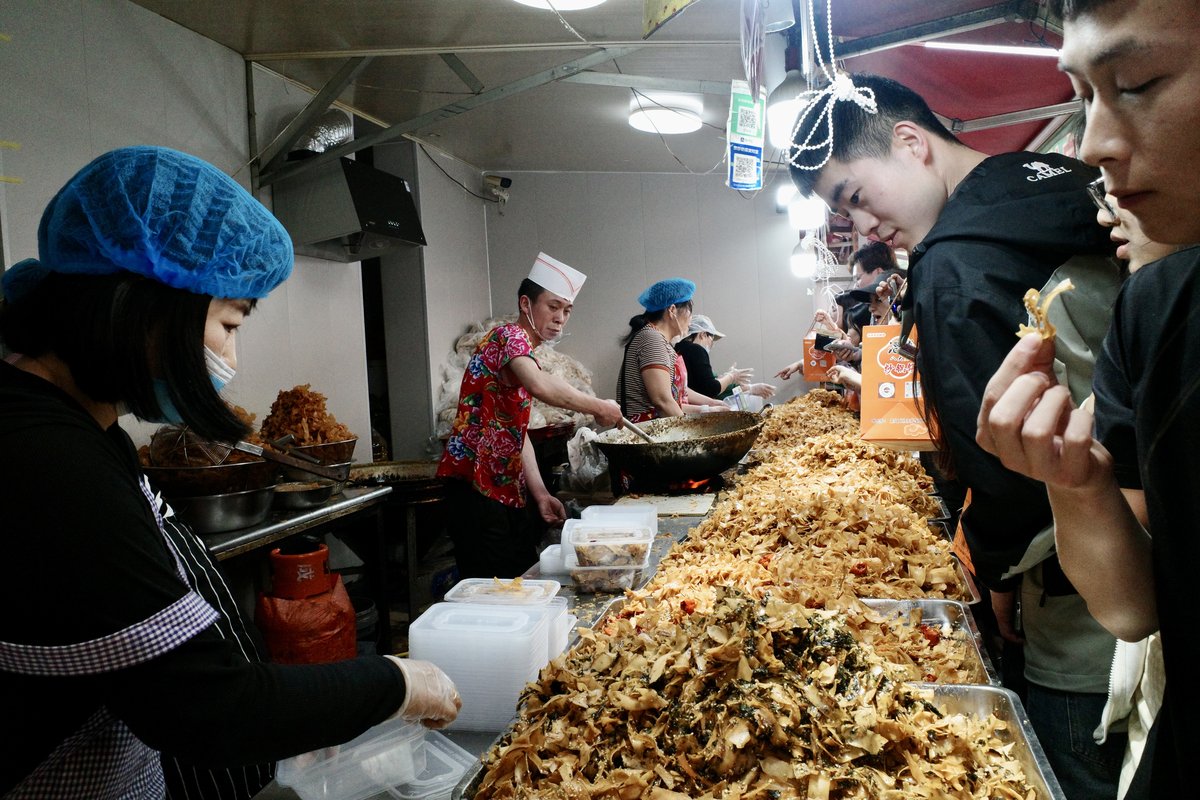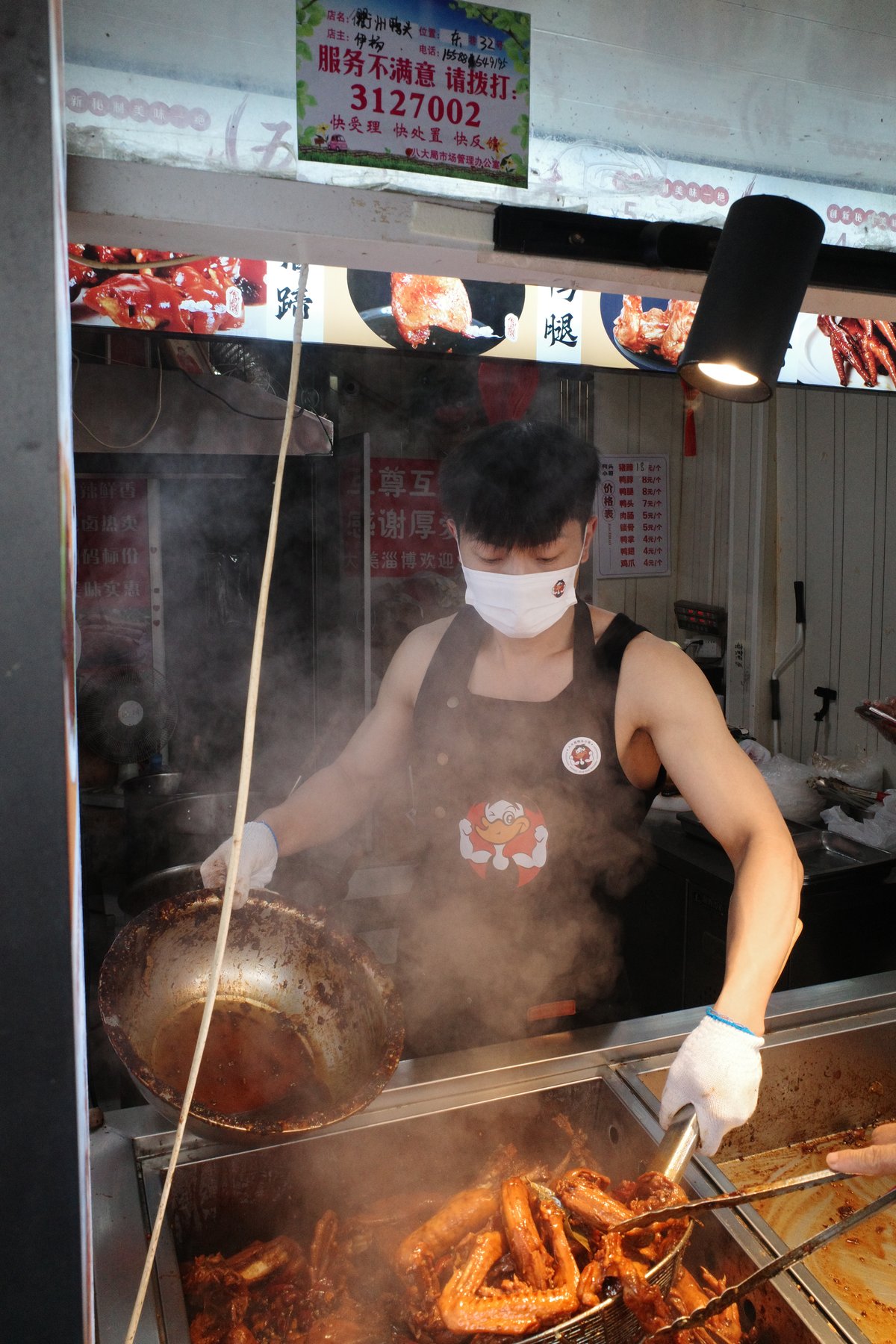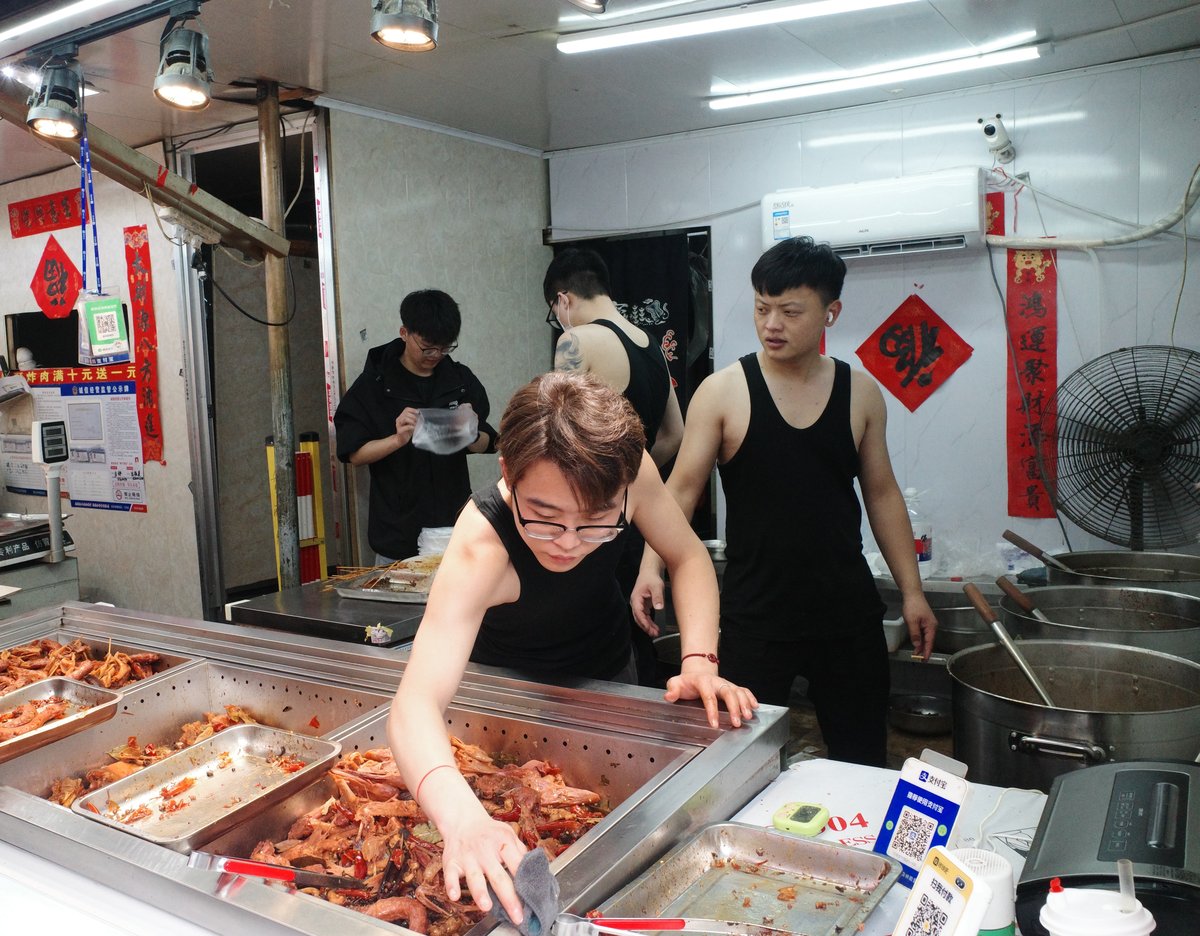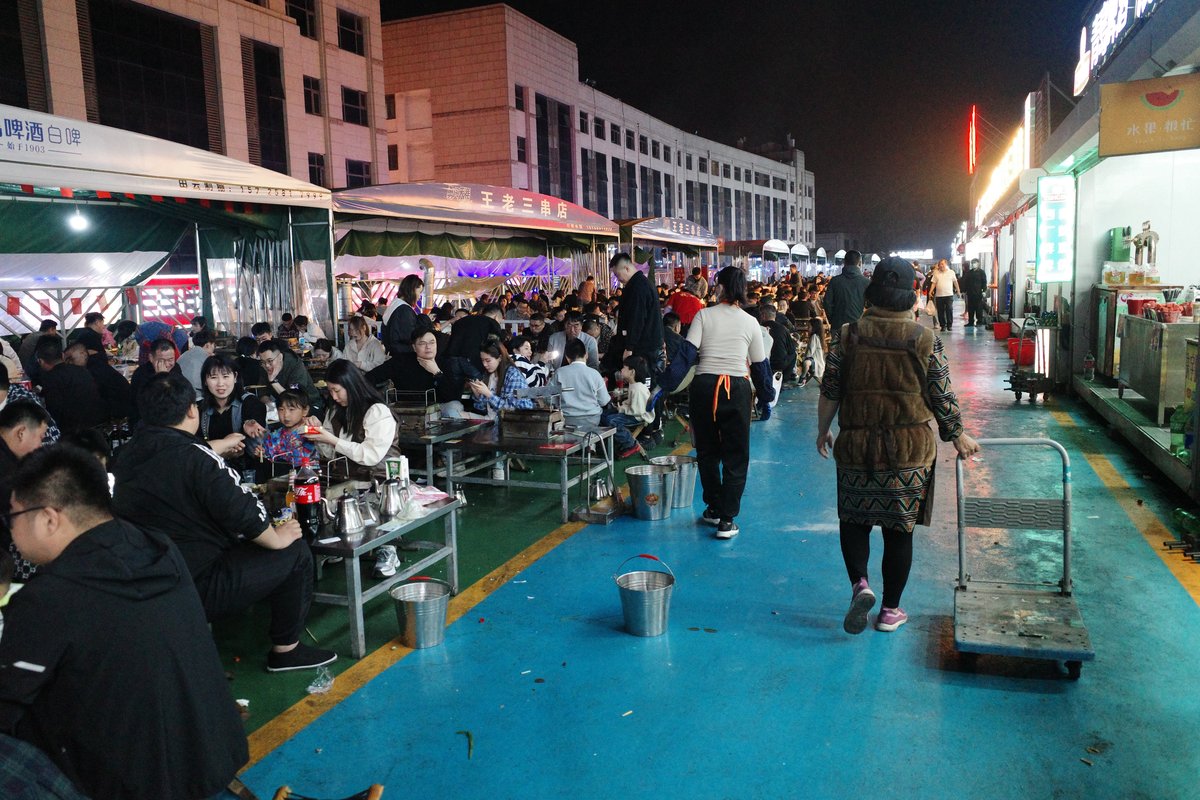One year after Zibo blew up online, why are tourists still pouring in?
A dense crowd gathers around a food stall on a Saturday afternoon in Zibo, Shandong province. Several smartphones are held above the sea of heads, zoomed in, ready to photograph a chef making a local delicacy. The stir-fried flour strips are sold for around 6 yuan a pop at around 50 shops in the Badaju street market, yet only one stall has any queues.
It’s not a special recipe that makes this particular shop popular. “There is absolutely no difference in taste, they’re all the same,” a young woman in the crowd tells TWOC over the sound of megaphone-carrying crowd control volunteers urging people to move on. “People aren’t here for the food, they’re here for him,” she says, motioning toward the stall. The smartphones are trained on Zibo’s latest social media sensation: A fry chef wearing a red Hawaiian shirt whose comical facial expressions and interactions with customers a few days earlier had gone viral on Douyin (China’s version of TikTok).
After Zibo and its barbecue restaurants became a viral sensation in April last year, many observers in the media and online believed the city would share the same fate as other once internet-famous tourist destinations: one cycle of virality with increased media attention, explosive tourist influx, followed by a quick cooldown, and then return to pre-viral normalcy.
Over the last three years, several places have experienced such virality due to their unique attractions or products, like Caoxian, Shandong province, with its significant share of the coffin market for Japan, or Hegang, Heilongjiang province, for its “cabbage price” properties where two-bedroom apartments sell for as little as 20,000 yuan. Their viral moments brought temporary attention and traffic but didn’t initially translate into sustained economic benefits or substantial tourism.
But one year on, massive crowds continue flocking to Zibo, leading many to wonder how the city escaped the curse of fleeting internet fame. The secret sauce to Zibo’s enduring allure, it turns out, is its ability to perpetuate the spectacle that initially drew attention, coupled with measures by the city government to enhance the overall tourist experience, for example by expanding facilities and improving consumer safety.
Zibo has not just retained its popularity but surpassed it. “It’s even more popular this year than last,” a 47-year-old local man surnamed Xia tells TWOC, a sentiment echoed by several people TWOC spoke to in the city this April. “We get about 70,000 to 80,000 visitors on a work day, and during the Qingming Festival, we had an average of 125,000 visitors per day, a 40 percent increase compared to last year,” local public security official Dong Wensheng told Legal Daily in late April about crowds at the Badaju street market.
Data from Meituan shows that travel-related Zibo transactions on the e-commerce platform increased by 130 percent compared to the same Qingming Festival holiday period last year while accommodation platform Tongcheng Travel reports hotel bookings in Zibo are up by 58 percent. Zibo’s moment in the sun shows no sign of ending.
Crowds gather in front of a flour strip shop in Badaju every day, hoping to catch a glimpse of the viral fry chef in his signature red Hawaiian shirt
Virality begets virality
Part of Zibo’s enduring allure stems from local government efforts to improve tourism facilities in the city, but there are other, more unpredictable reasons too.
The viral stir-fried flour strips shop was just one among dozens at the street market until a video of the comical fry chef blew up online. Now, there are hundreds of videos of him. In one, urban management officers acting like bodyguards for a rockstar escort him away from tourists. “Aren’t you frying any more flour strips today?” excited fans ask as he’s led away. That video on Douyin now has more than 1.4 million views, while the hashtag “Zibo stir-fried flour strips guy” has over 200 million hits on the short-video platform.
Stories like this create and feed the spectacle of viral Zibo that tourists demand. Another example is a muscular local seller known as “Duck Head Guy,” who went viral after videos of female customers touching his muscles without his consent hit social media in April 2023. He has become a local celebrity, with almost 430,000 followers on Douyin. Now, he sells just one batch of braised duck heads and other duck meats daily to an eager crowd of mostly female fans. Once the batch is sold out, he finishes for the day and leaves. The crowd scatters.
The Duck Head Guy no longer gives media interviews. He only wants to focus on selling duck meat this year, he told TWOC over Douyin. In previous interviews, he detailed the impact of last year’s explosive media attention. The shift from a quiet vendor to a public figure demanded a performance style and interaction that did not come naturally. Facing negativity online, he experienced moments of frustration, later saying that his viral fame made him more resilient to the ups and downs of life.
The virality keeps visitors eager to “check-in (打卡)” at the hottest tourist spots coming back to Zibo, and encourages more entrepreneurs to try to tap into virality. Just a few meters down the street from Duck Head Guy, three conspicuously handsome young men wearing identical black tank tops sell the same braised duck meat, but barely anyone is paying attention. “Isn’t that the Duck Head Guy?” one woman passing by says. “No, the real one is over there,” her male companion answers, dragging her on.
Social media exposure and subsequent tourism have helped some parts of Zibo’s economy boom in the last year. The first half of 2023 saw accommodation and food services, and retail sales of consumer goods grow by almost 10 percent. But despite these increases, Zibo’s annual GDP growth in 2023 still lagged behind the Shandong provincial average, while the services sector only grew by 5 percent—about two percentage points below the 2019 figure.
The benefits of Zibo’s new-found popularity are spread unevenly, as a vegetable market just a few meters away from the viral internet sensations attests—Badaju used to be a market for cheap local produce. “The tourism hasn’t impacted us much, to be honest,” one female shopkeeper explains. Another seller across the narrow street agrees: “Tourists don’t come here to buy vegetables, simple as that…The big business is mostly there on the ‘internet-famous’ main street you came from. Some of the sellers there aren’t even from Zibo.” TWOC found some shops run by outsiders, including one man from Hebei province who sells souvenirs like scented sachets—some of the proceeds from which will return to Hebei with the seller when he leaves Zibo at the end of the holiday season.
Adjusting to spectacle
The local government has also acted to maintain Zibo’s popularity, changing the city in the process. Last year, for example, authorities constructed a parking lot for around 400 cars just east of the Badaju street market. At 3 p.m. cars queue at the gate to get a spot. The car license plates indicate most of them are from Shandong province, but many tourists come from further away via high-speed train. Zibo is between Beijing and Shanghai, two of China’s biggest cities. Visitors from the capital can arrive in 2.5 hours, while it takes 4.5 hours from Shanghai.
At the Muyangcun barbecue hot spot in central Zibo, local authorities added extra shops around the perimeter and 11 vast tents for thousands of extra meat-hungry tourists. “They started setting these up in March or April,” one nearby seller explains. “They’re getting ready for the Labor Day madness. It’ll be filled to the brim.” Each tent can hold around 50 tables which comfortably seat five people, although sometimes up to 10 people cram around one.
The most famous restaurant there, the original Muyangcun BBQ, which first went viral last year, added three tents, doubling its capacity from the original 150 tables. Unlike last year, tourists no longer need to queue for hours to get a table number in advance, though even with the increased capacity, no tables are available on Saturday and Sunday evenings in April. Tents run by other restaurants are far emptier. Muyangcun BBQ remains the main viral attraction.
But changes have reached beyond the initially viral areas. Jinling, a small village a 20-kilometer drive east of Muyangcun, became popular in May last year after a video emerged of a barbecue seller surnamed Zhao claiming that his restaurant is the oldest barbecue joint in Zibo. Waves of tourists quickly besieged the place, overwhelming Zhao’s and other restaurants. A video online shows tourists banging on his door, imploring him to open up and serve them while a nervous Zhao peeks through a small opening in the metal gate to his restaurant.
One year on, Zhao is still there, often selling out his daily batch of skewers by the afternoon. “Every afternoon, I get at least 100 calls, sometimes 200 calls,” he says in a video posted on Bilibili on April 30, referring barbecue-hungry callers to other restaurants in the area. Many commenters praise his apparent honesty, arguing that this is why tourists flock to Jinling.
Some of the viral restaurants there have expanded considerably. New metal rain covers have been erected to accommodate hundreds of extra tourists. There are new public restrooms, and sellers offering fruit juice, popcorn, and other generic commodities one would expect at a tourist spot. Last year, droves of visitors were stuck in limbo, unable to get a seat at a restaurant or even move around easily when the arriving masses overwhelmed local restaurants and facilities.
A local complaints hotline received over 13,500 calls in April 2023, with many tourists reporting extreme queues, price-gouging, or a lack of accommodation. Since then, urban management officers have stepped up patrols to combat scams like fixed scales that inaccurately measure food sold by weight. Between March and the end of April this year, the hotline received a much reduced 2,300 complaints according to the official news outlet Legal Daily.
All these efforts keep the tourists rolling in. Back at the Badaju market, the social media bonanza continues. One local influencer who introduces herself as Nannan is busy trying to capture it all for her live audience on Douyin. Equipped with a cell phone mounted on a selfie stick, she moves between the different parts of the market to introduce Zibo-branded souvenirs and other merchandise.
Eventually, she passes through the viral food stall chokepoint. “Look how popular the stir-fried flour strips are!“ she tells her audience of about 1,300 viewers in excitement, raising the phone high above the sea of heads to capture a glimpse of Zibo’s Flour Strip Guy. “Likes” and comments pour in at the bottom of her screen. By tomorrow, some of that online traffic will probably have turned into more tourists visiting Zibo, sustaining the viral sensation that is the Badaju street market.
Additional reporting by Yang Tingting





